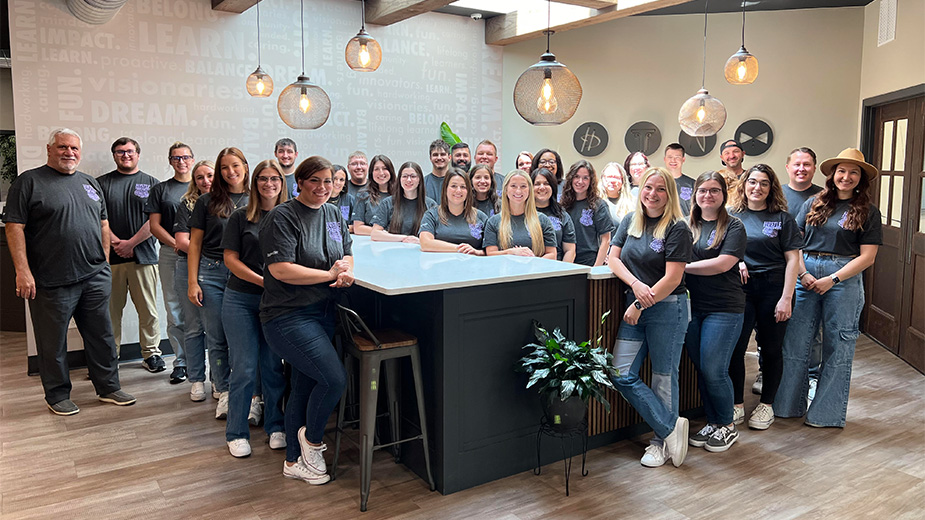Carney McNicholas Completes Mission in Africa
By Anna Carney
YOUNGSTOWN, Ohio – In May, Carney McNicholas Inc. completed the third phase of its installation of equipment at Camp Lemonnier in Djibouti on the Horn of Africa, less than two years after we first set foot in that country.
Our first project involved the transportation and installation of 22 40-foot overseas containers of furniture, fixtures and equipment, an effort that took us nine months of planning and coordination. In October 2013, we flew to the Horn of Africa through Ethiopia and spent the next 30 days working in 110-degree heat, unloading each container and installing it into the brand-new living quarters at Camp Lemonnier, Djibouti.
Camp Lemonnier, seven miles south of the Port of Djibouti, is the home to the bases of operations of several countries that include the United States, Italy, France and Japan. U.S. improvements at the camp began in the wake of the 9/11 attacks in New York City and Washington.
The nearness of the base to the Arabian Peninsula and Iraq was a major factor building it up and improving the Navy presence there from expeditionary to permanent status. The Department of Defense determined in 2007 that the U.S. mission required a long-term engagement. The camp, however, was in poor repair, leading to the start of renovations by the Combined Joint Task Force-Horn of Africa.
The original living quarters at the camp were far from sustainable, especially in temperatures that often reach as high as 120 degrees. When the expansion began, the U.S.-designed barracks were made from overseas shipping containers known as containerized living units.
These units are stacked three-high with plumbing, electricity, air conditioning, and common areas for entertainment and laundry areas. The units are fully furnished with American-made goods that offer storage and a measure of comfort in what many would assume are inhospitable conditions.
Carney McNicholas returned to Djibouti a second time in April, May and June of 2014 for an even-larger phase of 56 containers. Because this was a repeat trip, we knew what to expect. Even so, the hurdles remained: extreme heat, ameliorated in part only by a $1,000 per week bill for skids of bottled water, work interrupted daily by prayer as Muslims faced Mecca, communicating in the French, Somali, Afar, Ethiopian, Yemeni and Arabic languages, a malnourished workforce, security restrictions and massive amounts of construction.
To say this made for an interesting 10 weeks is an understatement.
Fortunately for our company, project managers Josh Waddell and Dan Lucko, both longtime employees from Cleveland, brilliantly maneuvered their way through the assignment by learning to communicate sufficiently in Somali and French.
Dan and Josh completed this second phase on time and under budget. Their willingness to travel long distances, their talent for navigating through this developing nation and Josh’s intuitive sense for linguistics were crucial elements in our company’s success in Djibouti.
After two phases and 78 containers of furniture, fixtures and equipment, it came as no surprise that the Department of Defense asked Carney McNicholas to return to Camp Lemonnier a third time. This phase was smaller – 16 containers – but instead of installing the furniture and fixtures into containerized living units, this trip had us place them inside the first modern barracks anywhere in Africa.
This building, known as “Barracks,” is the new home of more than 250 soldiers, sailors, marines and airmen. It is also the most energy-efficient structure in Africa with LEED (Leadership in Energy & Environmental Design) certification and is fully equipped with solar panels to supply the energy the building uses.
UniGroup, Inc., an international logistics firm headquartered in St. Louis, transported the furniture made in Grand Rapids, Mich., to the Port of Djibouti arranging with freight forwarder Marill Transit to complete the final leg. Among the destination services were clearing customs, delivering the containers to Camp Lemmonier and hiring the labor to accomplish this.
Carney McNicholas and the laborers then unloaded and installed the more than 250 beds and mattresses, desks, chairs, televisions, pool tables, pingpong tables, washing machines and dryers in four weeks, working Sunday through Friday.
The Barracks is being referred to at the camp as a “luxury” because it provides comfortable living conditions for the men and women who serve in our armed forces. And the improvements at Camp Lemmonier reinforce this nation’s message to the region that the United States intends to complete its mission.
The United States pays $65 million in annual rent to the government of Djibouti and continues to improve the living conditions at the site.
About the author: Anna Carney is director of international and domestic furniture, fixtures and equipment installation at Carney McNicholas Inc. She spent the first 10 days of this most recent project, which she spearheaded, on-site in Djibouti.
“Djibouti is one of the most special places I have ever visited,” she says. “The people there are sweet, modest and grateful for your acknowledgement of their culture. I look forward to going back.”
Pictured: A container of furniture, fixtures and equipment reaches Camp Lemonnier in Djibouti, Africa, where Carney McNichols Inc. installs the equipment into living units.
Copyright 2024 The Business Journal, Youngstown, Ohio.


